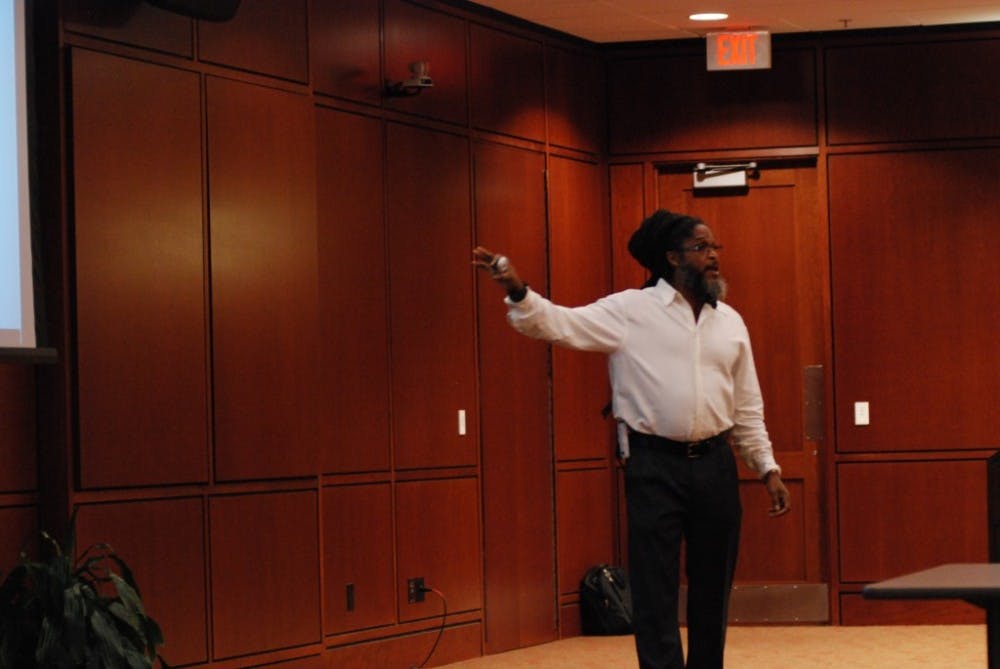“All I do is file papers. I’m not learning anything in my job. I don’t want to give up on my education.”
These were the words Charles Price used to quote a welfare recipient in New York who struggled to maintain welfare status while working and attending school. Price, an associate professor in the Department of Anthropology at the University of North Carolina Chapel Hill, used these words and other narratives — which he obtained during his research on welfare reform — in his talk at Elon University March 29, entitled “Interrupting Oppression and Sustaining Justice: Lessons from Welfare Reform.”
The speech was sponsored by PERCS, Elon’s Program for Ethnographic Research and Community Studies.
[quote]We really scoured the country to secure the broadest range of support possible to galvanize the issue. It made us realize for the coalition’s efforts to work you had to understand the position of the locality. - Charles Price, associate professor at UNC Chapel Hill[/quote]
Tom Mould, director of PERCS and associate professor of sociology and anthropology, introduced Price and said Price’s speech connected to three-year narratives about public assistance and debunking negative stereotypes that constrain the social systems’ capabilities.
The Personal Responsibility and Work Opportunity Reconciliation Act, (PRWORA) which passed in 1996 during the Clinton administration, has since limited welfare recipient participation in postsecondary education, according to Price.
“President William Clinton promised to end welfare as we knew it,” Price said.
But in Price’s opinion, Clinton botched the response.
Price said the resulting program, Temporary Assistance for Needy Families (TANF), limits the maximum time for people to receive welfare to five years, and after that time, the recipient can never access the program again. Another limitation Price attributed to TANF is that recipients must obtain a job within two years of initial subscription or be dropped from TANF. Price said welfare recipients are often bound to jobs with pay levels dictated by their levels of education.
“(Recipients) are often working and poor for the rest of their lives,” he said.
The stipulations of welfare allow little time or resources for pursuing a postsecondary education — an important device in overcoming welfare, according to Price. He said the welfare program should take into account educational expenses and study the success rates of recipients with higher education.
“Prior to the 1990s, there was very little research into the connection between a postsecondary education and welfare, he said.”
Price showed statistics indicating a positive correlation between postsecondary education and salary for recipients of welfare.
“A bachelor’s degree could double the amount that people could earn if they only had a high school diploma,” he said.
In one of his studies, Price found that a certain group of welfare recipients who had obtained bachelor’s degrees were able to come off welfare. Price said another group whose members had associates degrees were only 81 percent successful in that regard.
“Welfare reform distorts outcomes by restricting recipients’ access to college.”
Price said social stigmas and misinformation attached to welfare programs are also a problem. During his employment at the Howard Samuels State Management Policy Center, a research center that delves into matters of equality and democracy across a wide spectrum, he strove to gain the widest outlook on people’s perceptions from a variety of perspectives. This included a series of case studies in different states and counties.
“We really scoured the country to secure the broadest range of support possible to galvanize the issue,” Price said. “It made us realize for the coalition’s efforts to work you had to understand the position of the locality.”
Price said one of his most profound experiences on the issue of welfare awareness occurred during a walk-a-thon for the cause in Maine. Price said the event was structured to bring representatives from both major political affiliations together. At the end of the walk, Price said he was approached by one of the politicians in attendance who voiced a realization.
“You know, I really had no idea of what welfare recipients had to go through and not get education — they should (have access to) a degree.”


